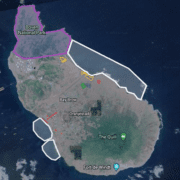Dutch Caribbean Islands move to save coral reefs
Black Immigrant Daily News
A major environmental project is under way in St. Eustatius – affectionately known as Statia – and Saba to reduce erosion and safeguard endangered reefs around the two islands in the Caribbean Netherlands. The project, dubbed “Healthy and Resilient Marine and Coastal Ecosystems Through Reforestation of St Eustatius and Saba”, will include the reforestation of areas stripped bare of vegetation due to land erosion caused by heavy rainfall.
“Due to large increases in above-ground water movement during heavy rainfall, along with the low abundance of vegetation on the islands, the near-shore coral reef ecosystems have been severely impacted,” said Anthony Reid, Statia’s director of economy, nature, and infrastructure (ENI). “In response to this impact, this project aims to enhance the ability of the governments and national parks foundations on both islands to respond to the needs of the marine environment through reforestation. This will improve the ecosystem services, biodiversity, and economic resilience of Statia and Saba.”
The EUR722,165 project is funded by the European Union, through its 11th European Development Fund programme, a EUR30.5 billion aid package for African, Caribbean and Pacific countries and overseas countries and territories (OCTs). The Dutch Caribbean islands’ undertaking falls directly under the Resilience, Sustainable Energy and Marine Biodiversity Programme (RESEMBID), a 69-month programme which began in 2019 to support the sustainable human development efforts of the 12 Caribbean OCTs, namely: Anguilla, the British Virgin Islands, the Cayman Islands, Montserrat, the Turks and Caicos Islands, Aruba, Bonaire, Cura?ao, Saba, Statia, St. Maarten and St. Barths.
The implementing partner for RESSEMBID is Expertise France, the French public agency for the design and implementation of international technical cooperation projects, which signed an agreement with the Statia government late last year, under which Statia will oversee implementation of the venture.
The St Eustatius National Parks Foundation (STENAPA) will execute the project as part of a memorandum of understanding (MOU) signed with the Statia government. Other partners for this activity are the Saba Conservation Foundation (SCF) and the Government of Saba.
As part of the MOU, Statia (8.1 square miles) and Saba (five square miles) will share expertise and experiences. Statia will also begin cultivation of plants for Saba, while that island builds the necessary infrastructure. Statia’s beekeepers will also train potential new beekeepers in Saba.
“The team at STENAPA and SCF look forward to continuing, improving, and expanding our planting efforts working on the experience and knowledge we’ve gained over the last few years. Working with the government and each other to reduce erosion around Statia and Saba will help safeguard our reefs, benefiting fishermen, divers, and everyone who values our islands’ valuable marine environment,” said Erik Bowman, the STENAPA director. “Increasing biodiversity – especially of pollinators, such as bees – will benefit not only Statia and Saba’s nature, but also help our agricultural sectors and help towards improving our islands’ food security and hurricane resilience.”
The non-government organisations and the Statia Government signed an agreement late last year, financed by the EU and implemented by the Expertise France programme, RESEMBID. This project will benefit both Statia and Saba by reforesting erosion-prone, watershed and discharge areas, which in turn will slow and redirect water into below-ground aquifers in the denuded areas. It will also restrict the release of sediment onto surrounding coral reefs. Thus, it will improve the resilience of both the forest and coral reefs, for the benefit of the local populace.
Donate At Caribbean News Service, we do not charge for our content and we want to keep it that way. We are seeking support from individuals and organisations so we can continue our work & develop CNS further.
NewsAmericasNow.com










